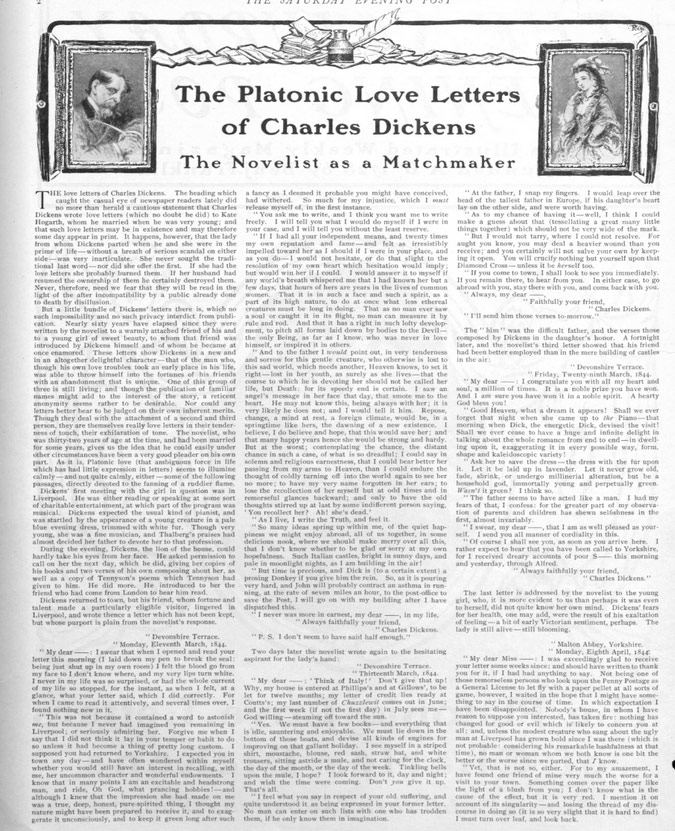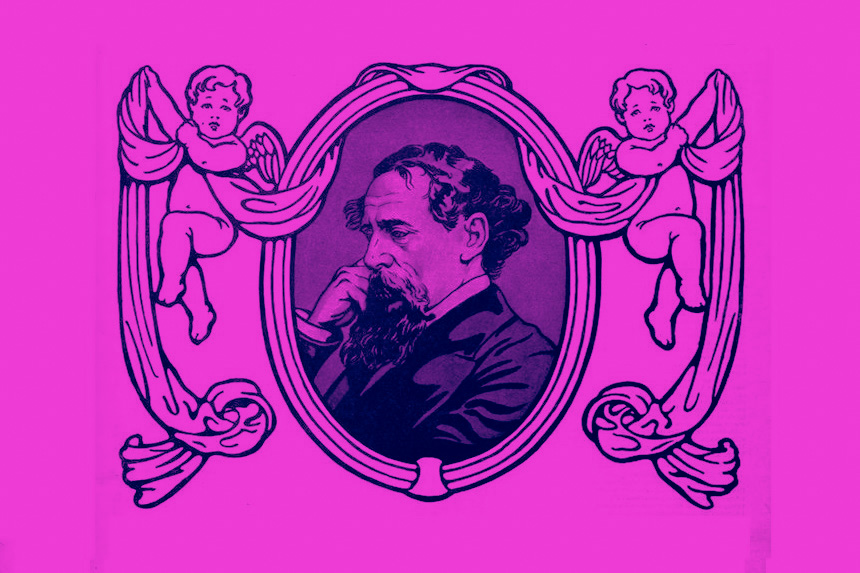Have you ever sat eagerly at a desk, pen in hand, to scrawl an epically heartfelt love letter to your dearest, only to find you have disappointingly little to say? The stakes are high, and the pressure is on to put your deepest affections on paper, but somehow it all seems hokey and inadequate.
It’s safe to say that Charles Dickens, a writer whose work numbers in the tens of thousands of pages, did not have this problem. At least, he did not experience difficulty writing lengthy, expressive letters to his friends. His longtime wife, Catherine, received comparatively practical correspondence around the time that he was composing toothsome letters to acquaintances with hopes of bringing them together.
This magazine published a batch of Dickens’s letters in 1901, “The Platonic Love Letters of Charles Dickens,” that showed “Dickens in a new and in an altogether delightful character — that of the man who, though his own love troubles took an early place in his life, was able to throw himself into the fortunes of his friends with an abandonment that is unique.”
The Post did not disclose the identities of the man and woman to whom Dickens wrote in 1844 because one of them was still alive at the time. The couple was Thomas James Thompson and Christiana Jane Weller (who died in 1910). As he describes in his letter, Dickens saw Weller perform as a pianist in Liverpool and was immediately enraptured by her beauty. It would be a difficult task to find any of the author’s writing about his own wife that compares to his gushing praise of Weller in his letters to Thompson (“I would answer it to myself if any world’s breath whispered me that I had known her but a few days, that hours of hers are years in the lives of common women”).
While the letters of legendary authors remind us of their uncommon talent for using the English language, they can also serve as templates for our own communication. Even if you can’t string together complex, wordy images like Dickens, you can still write to your acquaintances in the longform, and the prose that transpires could surprise you. Without the pressure to live up to a romantic ideal, platonic letters can focus on a different kind of love. Friendship, while perhaps less urgent than romance, is as lasting and deep. To start, take a (literal) line from Dickens, and use his post script: “P.S. I don’t seem to have said half enough.”
Charles Dickens to Thomas James Thompson:
Devonshire Terrace.
Thirteenth March, 1844.
My dear — : ‘Think of Italy!’ Don’t give that up! Why, my house is entered at Phillips’s and at Gillows’, to be let for twelve months; my letter of credit lies ready at Coutts’s; my last number of Chuzzlewit comes out in June; and the first week (if not the first day) in July sees me — God willing — steaming off toward the sun.
Yes. We must have a few books—and everything that is idle, sauntering and enjoyable. We must lie down in the bottom of those boats, and devise all kinds of engines for improving on that gallant holiday. I see myself in a striped shirt, moustache, blouse, red sash, straw hat, and white trousers, sitting astride a mule, and not caring for the clock. the day of the month, or the day of the week. Tinkling bells upon the mule, I hope? I look forward to it, day and night ; and wish the time were coming. Don’t you give it up. That’s all.
I feel what you say in respect of your old suffering, and quite understood it as being expressed in your former letter. No man can enter on such lists with one who has trodden them, if he only know them in imagination.
At the father, I snap my fingers. I would leap over the head of the tallest father in Europe, if his daughter’s heart lay on the other side, and were worth having.
As to my chance of having it—well, I think I could make a guess about that (tessellating a great many little things together) which should not be very wide of the mark.
But I would not tarry, where I could not resolve. For aught you know, you may deal a heavier wound than you receive; and you certainly will not salve your own by keeping it open. You will crucify nothing but yourself upon that Diamond Cross—unless it be herself too.
If you come to town, I shall look to see you immediately. If you remain there, to hear from you. In either case, to go abroad with you, stay there with you, and come back with you.
Always, my dear —,
Faithfully your friend,
Charles Dickens.

Become a Saturday Evening Post member and enjoy unlimited access. Subscribe now



